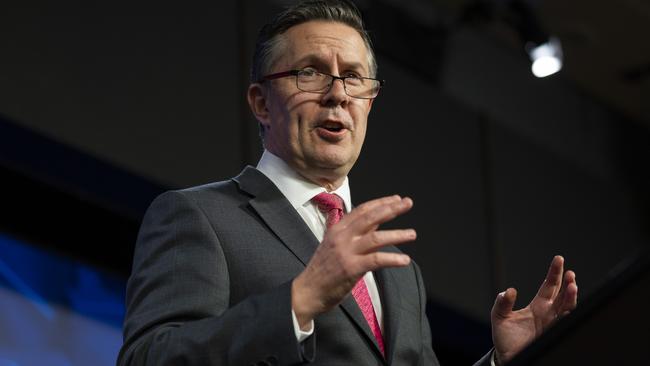Pharmacy policy shift takes Labor off script
Mark Butler’s double whammy for chemists could backfire on the very people it was intended to help.

I’m talking about Health Minister Mark Butler’s decision to double prescriptions from 30 to 60 days. Pharmacists charge a disbursement fee, which effectively will be halved courtesy of the policy change. The budget saving will come in at around $1.2bn. Seems innocuous enough, right? Wrong.
Pharmacists already manage their inventory (prepayment of scripts behind the counter is standard industry practice) with all the care any small business needs.
This policy change will mean it costs more to keep more behind the counter, with pharmacists then paid less on the distribution side. It’s a double whammy.
At the very least, Labor apparatchiks in favour of this policy simply don’t understand the small-business challenges many pharmacists face. Neither do the bureaucrats safely ensconced in Canberra, nor the many journalists who have already endorsed the policy script they have yet to even read (beyond a press release). The economic hit might be able to be absorbed by the bigger chain pharmacists, but less so for those local pharmacists in regional and small communities that offer a more bespoke service.
Inevitably, industry concentration will follow. The overseas experience with extending dispensing times has been a reduction in the access points to pharmaceutical services – the health and medicines equivalent of bank branches closing, except this time government policy will be the cause. Regional and local community pharmacists that do survive will be forced to recoup the cost via reductions in staffing levels and customer care. Some may need to close down altogether, a point the head of the Pharmacy Guild made last week. Which is all before you even consider the medical risks attached to allowing patients to double dosages of their medicines at home.
While it’s understandable some consumers would see upsides to the change – a mixture of cost savings and convenience – the laws of unintended consequences will soon become apparent if the policy adjustment goes ahead. Details will be unveiled in Tuesday’s budget and it’s due to take effect from September.

Medical misadventure, including overdoses, and wastage are real risks. For the elderly, medication can be confusing at the best of times, not least in the case of dementia patients, for example, or those with other cognitive limitations. While the government claims doctors will make judgment calls on access to double-dosage scripts, thereby ameliorating these concerns, the practical realities of cheaper distribution will inevitably take over in cases where it shouldn’t.
Simply put, the government wants to find ways of reducing cost-of-living pressures in the high inflationary environment we are in. I get it. But rather than doing so itself via increased government assistance, it’s putting that burden on to pharmacists – the equivalent of just putting up taxes rather than embarking on tax reform.
If the government were serious about health and medicines reform, it would take on the doctors groups, and the first step would be mandatory disclosure of out-of-pocket fees on a public website as a condition for accessing Medicare.
But real reform is hard. The Australian Medical Association’s support for this policy change isn’t echoed by doctors I have spoken to. It reeks of an industry turf war, as pharmacists get entrusted with responsibilities once carved out for general practitioners, because accessing a GP in this country is becoming increasingly hard to do (or expensive). Fixing that policy failure is harder than slugging pharmacists.
Butler tried to use the extra investment going into community pharmacies to justify his prescription medicines change. More than $1bn is being invested in services including pharmacies giving Covid-19 vaccine jabs alongside other professional health services.
But this spending doesn’t assist the economic viability of pharmacies – it tends to be cost-neutral for the proprietor, even if it improves the consumer experience. Besides, if the change to prescription medicines forces the closure of pharmacies, or a paring back of services, that will more than nullify the investment.
There is also a shortage of medicines right now, much less when customers can double what they take, however much the government insists there isn’t. A spokesperson for the Health Minister insisted there are only seven medicines on the 300-plus list out of stock, but when I pressure-tested this assertion with a visit to my local pharmacist he kindly showed me the medicines list.
I counted well into double digits when adding up vital medicines listed as out of stock that particular day, including the drug Ozempic, which is used to treat diabetes. Because it’s also now been identified as a way to lose weight, demand has soared. Diabetics stockpiling the drug under the new rules being brought in will only exacerbate the shortages, with potentially dire health consequences. Will this become a non-pandemic version of toilet paper shortages this year?
Worst of all, for a government spruiking the need to do the basics well in the name of good governance, to implement this policy without much consultation with the sector is poor form. It fails the most basic test of the policymaking cycle, public policy 101. Before settling on a policy outcome, policymakers need to adequately consult, to widen the arc of information at their disposal before embarking on a particular course of action.
This policy misstep is unfortunate, given Butler’s laudable changes to vaping laws. Vaping among today’s youth is nothing short of a national crisis, one that was allowed to worsen during the Morrison years. Butler’s bold intervention is to be applauded.
Cracking down on the spin from the tobacco industry is an example of strong politicking in response to calls for change. Answering the AMA’s call for changes to prescriptions is an entirely different matter.
So why is Butler so eager to make this policy change? For a start, all ministers are expected to find savings come budget time. This represents his. It also signals that Butler is not a policy tortoise; useful for a Labor ideologue, especially in the context of a cost-of-living crisis. Politically, Labor needs examples to show it’s addressing the issue. Even if the unintended consequences on this policy front are likely to rebound further down the track.
Peter van Onselen is a professor of politics and public policy at the University of Western Australia and Griffith University.








Labor is stumbling its way towards an ill-considered policy change with unintended consequences, a classic case of being captured by the bureaucracy and a desire to announce a modest improvement to the budget bottom line in the hope that popular support ensures any backlash is minimal.